The Soweto student Uprising, Desmond Tutu, and TEE College - some painful and hopeful history
 Saturday, June 18, 2022 at 4:11PM
Saturday, June 18, 2022 at 4:11PM 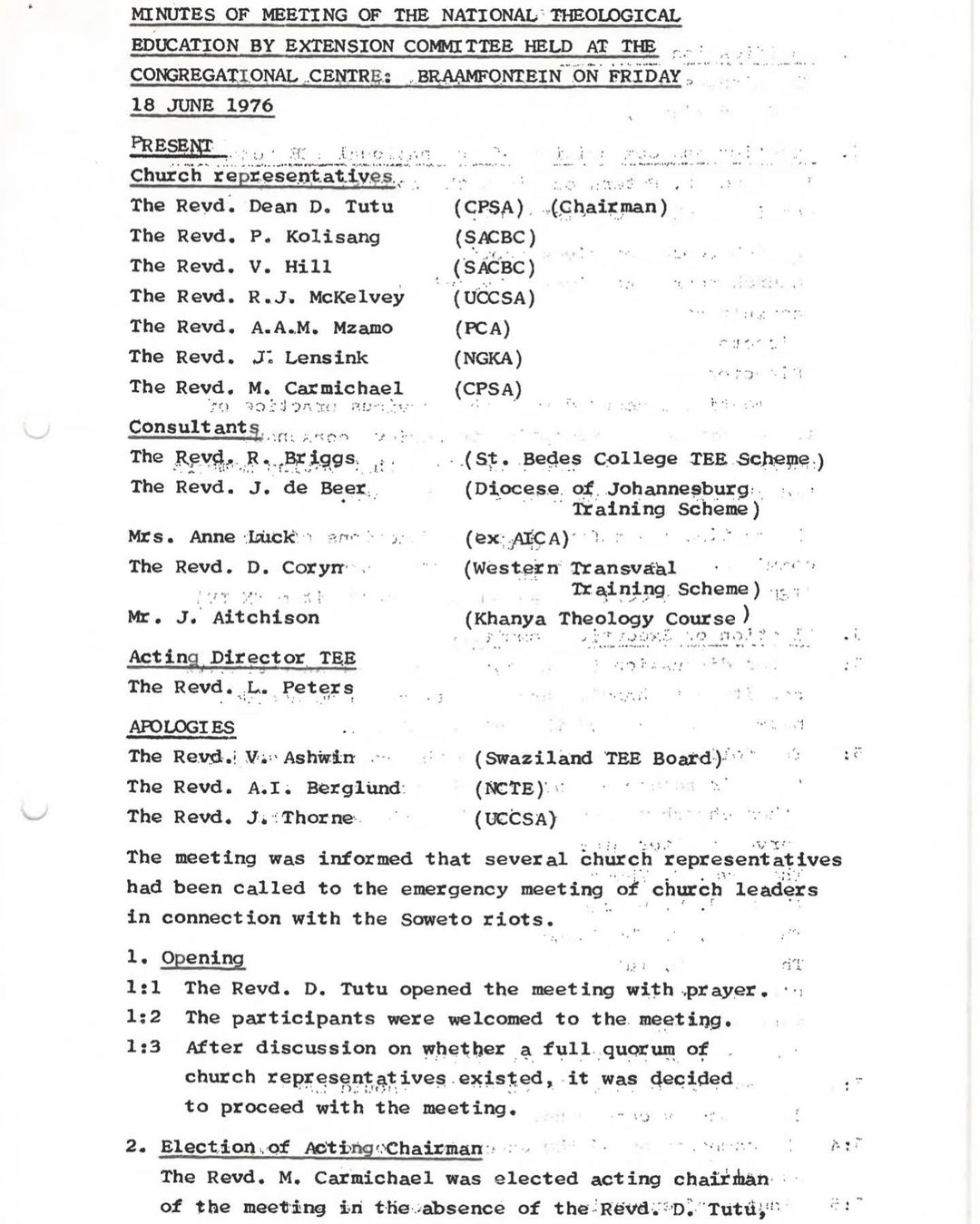 Here is a bit of painful, and hopeful, history.
Here is a bit of painful, and hopeful, history.
 Saturday, June 18, 2022 at 4:11PM
Saturday, June 18, 2022 at 4:11PM  Here is a bit of painful, and hopeful, history.
Here is a bit of painful, and hopeful, history.
 Sunday, December 26, 2021 at 3:09PM
Sunday, December 26, 2021 at 3:09PM 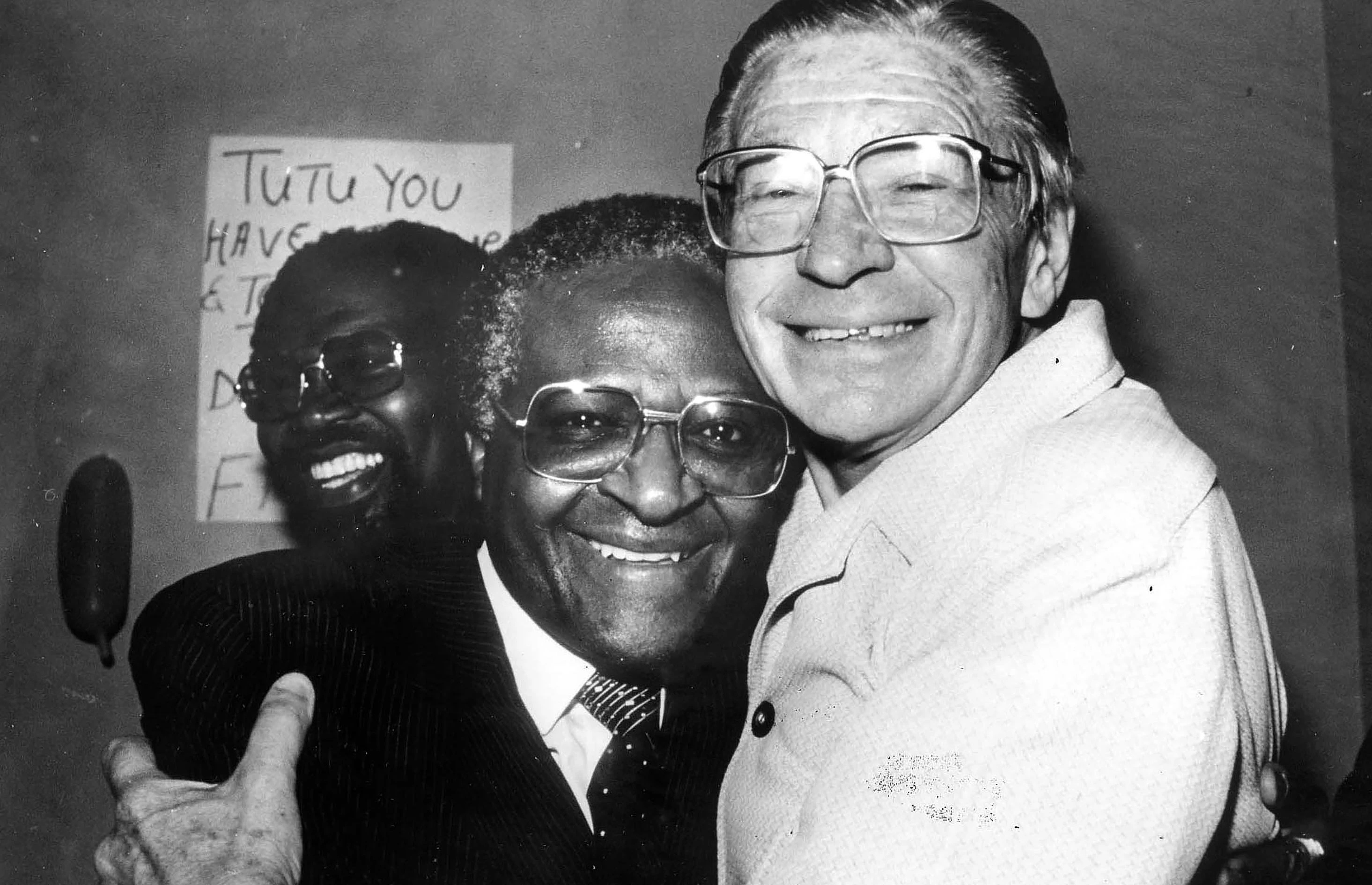 SOUTH AFRICA – OCTOBER 19, 1984: Bishop Desmond Tutu and Beyers Naude, with Manas Buthelezi in the backround. (Photo by Gallo Images / Avusa / Margo Williams).It was with great sadness that I learned of the passing of Archbishop Desmond Mpilo Tutu (7 October 1931 - 26 December 2021).
SOUTH AFRICA – OCTOBER 19, 1984: Bishop Desmond Tutu and Beyers Naude, with Manas Buthelezi in the backround. (Photo by Gallo Images / Avusa / Margo Williams).It was with great sadness that I learned of the passing of Archbishop Desmond Mpilo Tutu (7 October 1931 - 26 December 2021).
He was a remarkable human being, a person whose life was shaped by his faith in Jesus Christ, and the ethical responsibilities that arose from a lived spirituality. He was a great colleague and friend to Rev Dr Beyers Naudé, and because of that showed great friendship and commitment to the Beyers Naudé Centre for Public Theology, and the Faculty of Theology, at the University of Stellenbosch. Of course he had a much closer relationship to the University of the Western Cape, where he served as Chancellor for almost 25 years. His willingness to build strong and meaningful relationships with the University of Stellenbosch, in spite of the role that this institution played in South Africa's apartheid history, is itself a testimony to his tendency to work for reconciliation and justice. You can find the official statement from the University of Stellenbosch here.
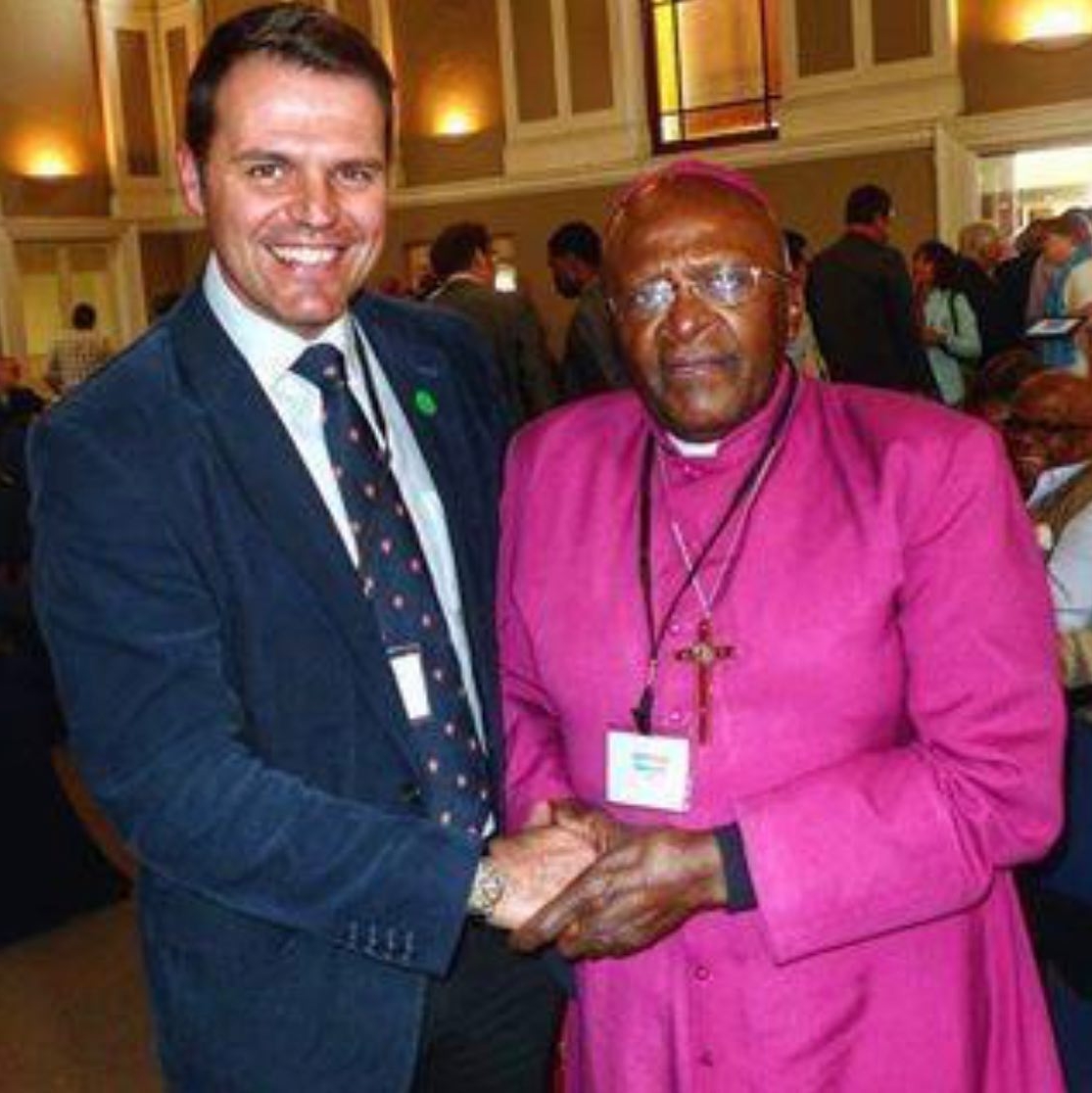 SOUTH AFRICA - OCTOBER 8, 2014: Bishop Desmond Tutu and Dion Forster (TRC re-enactment Beyers Naudé Centre for Public Theology, Faculty of Theology, Stellenbosch University).I had a few conversations with colleagues in the Faculty of Theology today about Archbishop Tutu's involvement over the years. He was best known by the late Professor Russel Botman (former lecturer at UWC, and later Lecturer and Rector at Stellenbosch University), but also by Prof Nico Koopman (my predecessor as Lecturer in Public Theology and Director of the Beyers Naudé Centre for Public Theology, now Vice Rector at Stellenbosch University), Prof Christo Thesnaar, and Dr Sipho Mahokoto (among others). Here are a few important moments that we could remember:
SOUTH AFRICA - OCTOBER 8, 2014: Bishop Desmond Tutu and Dion Forster (TRC re-enactment Beyers Naudé Centre for Public Theology, Faculty of Theology, Stellenbosch University).I had a few conversations with colleagues in the Faculty of Theology today about Archbishop Tutu's involvement over the years. He was best known by the late Professor Russel Botman (former lecturer at UWC, and later Lecturer and Rector at Stellenbosch University), but also by Prof Nico Koopman (my predecessor as Lecturer in Public Theology and Director of the Beyers Naudé Centre for Public Theology, now Vice Rector at Stellenbosch University), Prof Christo Thesnaar, and Dr Sipho Mahokoto (among others). Here are a few important moments that we could remember:
He is remembered as a faithful and courageous servant of Jesus, and a champion for the values of God’s just, loving, and inclusive Kingdom. His ministry as an Anglican Priest and Bishop shaped so much of the Church's work and witness during some of the most difficult times in South Africa's history (both before the end of political apartheid, and in the years after the dawn of participatory democracy). He was a great theologian with a deep commitment to Black and African Christian theologies of Liberation. Under his leadership many of us were inspired to take a stand on important issues such a anti-racism, economic justice, gender rights, the rights of LGBTI+ persons, and the plight of Palestinians under the Israeli occupation (to name just a few).
We pray for his family, friends, the Church, and all those who mourn his passing.
May he Rest In Peace and rise in Power.
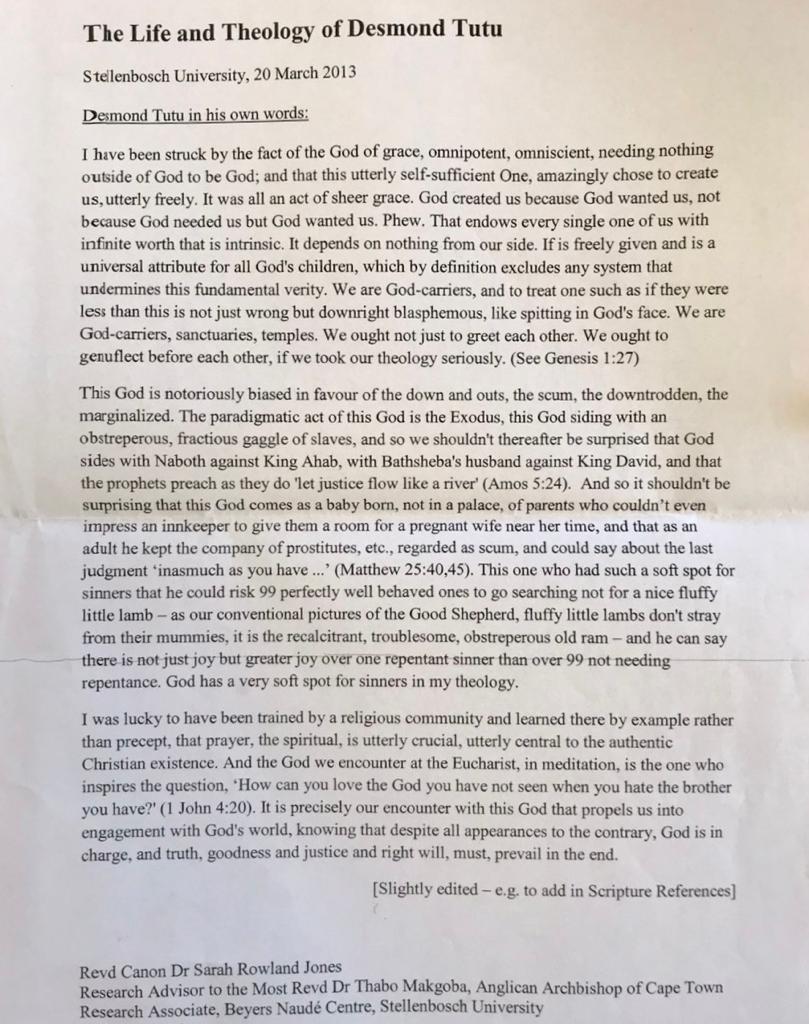
 Friday, September 23, 2016 at 2:33PM
Friday, September 23, 2016 at 2:33PM Dion Forster, Stellenbosch University
The legacy of anti-apartheid activists no longer has currency for many of today’s youth. They believe that they have been failed by the older generation of political leaders, including Nelson Mandela.
A recent Facebook post by the controversial Oxford University student and Mandela Rhodes scholar, Ntokozo Sbo Qwabe reflects this.
Older black people who want to silence us on the basis that they fought against apartheid need to shut the fuck up!!! We are here because you failed us! So please!
Qwabe is expressing a sentiment that is fairly common among contemporary South African student activists associated with the country’s “fallist” movements - including #RhodesMustFall #FeesMustFall .
One could say that they have “lost faith” in the legacy of anti-apartheid heroes of yesteryear and the supposed freedoms they have won.
Some may be unsettled, or even angered, by this loss of confidence in the liberation struggle heroes. But I am of the opinion that this loss of faith may not be such a terrible thing in the end. Losing a naïve and untrue “religious conviction” might actually be a sign of the emergence of a more honest and mature commitment to an ethics of responsibility.
South Africa is not unique in this. North American activist and philosopher, Cornel West, recently made a radical statement at a “Keep Ferguson Alive!” event. He said:
I come from a school of thought that believes that a certain kind of atheism is always healthy… Because what atheism does is that it at least cleans the deck because it claims that all gods are idols… We live in a society in which idolatry is so ubiquitous… So, for a lot of people who have lost faith in god it is probably a healthy thing! Because the god they have lost faith in was probably an idol anyway…
Losing faith in a false god is not such a bad thing. Many South Africans are losing faith in a very subtle and deceptive form of civil religion that held many in thrall during the last 22 years of democracy. As shocking as it may be, perhaps Qwabe and West are not far from the truth.
After the euphoria of the peaceful transition to democratic political rule in South Africa in 1994, this subtle civil religion emerged in popular culture.
Sociologist Robert Bellah suggests that religion in the civil sphere is possible when citizens begin to shape a belief into a transcendent narrative of about their social and political reality. They begin to use religious or theological symbolism to describe social, political or economic systems and processes. The purpose of the “civil religion” is to work towards the project of an alternative social reality.
The birth of the South African post-apartheid civil religion took place 27 April 1994 – the day of first South African democratic elections. This event was lauded across the world, as a “miracle” of peaceful transition in the midst of a hostile and precarious social and political situation.
Many doomsday prophets had predicted the eruption of a civil war in the lead to up the elections. Instead, post-election media reports reflected a widespread sense of euphoria and joy. It was framed in the dense and symbolic theological and religious language of peace, reconciliation and even “God’s blessing”. This is not surprising in a country where [around 84% ]of its population profess religious beliefs of one kind or another. Such language is familiar. It has meaning and currency.
Of course, every religion requires a saviour, and the Messiah of this civil religion was Nelson Mandela. He embodied in his person a capacity to envision a new future for the divided people of South Africa. He was widely regarded as a leader who displayed great courage, grace and a reconciling nature.
His virtuous character was presented as an example to be followed by all persons who strive to be good citizens. Today many wonder about the negotiated compromises he entered into during his presidency and the transition to democratic rule. Perhaps, he was only human after all. Even if he was a remarkable human, he is not divine.
The high priest of the newly democratic South Africa’s civil religion was Desmond Tutu, who coined the primary discourse of the (civil) religion in the language of the “rainbow nation”. The character of the religion, and its doctrinal centre was an eschatological harmony based on national reconciliation.
This miracle was to be ushered in through a social event – a ritual. The ritual that served as a moral and psychological symbol of the civil religion was the TRC (Truth and Reconciliation Commission). Sadly, the legacy of the TRC is contested. Perpetrators walked free while victims remained uncompensated.
 Archbishop Desmond Tutu Mike Hutchings/Reuters
Archbishop Desmond Tutu Mike Hutchings/Reuters
The civil religion’s sacred text was the 1996 South African Constitution (1996) and the Bill of Rights. The hymn for the civil religion was national anthem, Nkosi sikele’iAfrika(God bless Africa]). But some worry that the constitution protects the rights of the privileged and does not go far enough in allowing for restorative justice for the poor.
So, what has become clear in recent years is that there is significant loss of confidence in the discourses of the new South Africa - the rainbow nation, and all of the saints, heroes, and rituals. People are losing faith in this civil religion. This disenchantment is most clearly expressed in the words and actions of the “born free” activists, such as Qwabe.
They believe that we find ourselves in a more deeply divided, more economically unjust and politically corrupt nation because of our beliefs in these persons, in their legacies, and in the institutions they established.
While many may struggle to agree with the methods of the ‘fallist’ youth, perhaps they are pointing us in the right direction? Yes, Mandela did something remarkable. But he is not our saviour. Tutu and the TRC are inspiring and important. But now we need something for this time. Yes, democracy is an opportunity for transformation. But the 1994 elections were not the end of our process. That was only the beginning.
And so, I am of the mind that we should lose our false civil religion and exchange it for an ethics of responsibility. The poet June Jordan said it most aptly, reflecting on the women’s march to the Union Buildings in 1956:
And who will join this standing up … We are the ones we have been waiting for.
![]()
Dion Forster, Head of Department, Systematic Theology and Ecclesiology, Senior Lecturer in Ethics and Public Theology, Director of the Beyers Naudé Centre for Public Theology, Stellenbosch University
This article was originally published on The Conversation. Read the original article.
----
You may find these two videos (related to Nelson Mandela, and the end of Civil Religion) interesting.
'Losing my religion (in Basel)'
Nelson Mandela and the Methodists - faith, fact and fallacy
 Sunday, July 17, 2016 at 8:58AM
Sunday, July 17, 2016 at 8:58AM
South African pastor and bishop Peter Storey said, “American preachers have a task more difficult, perhaps, than those faced by us under South Africa’s apartheid, or Christians under Communism. We had obvious evils to engage; you have to unwrap your culture from years of red, white and blue myth. You have to expose, and confront, the great disconnection between the kindness, compassion and caring of most American people, and the ruthless way American power is experienced, directly and indirectly, by the poor of the earth. You have to help good people see how they have let their institutions do their sinning for them. This is not easy among people who really believe that their country does nothing but good, but it is necessary, not only for their future, but for us all.”
This beautiful quote from my mentor, and former Bishop, ties in with what I tried to convey in this video 'Losing my religion in Basel'.
In this blog I travel by bike and train from Nijmegen in Holland to Basel in Switzerland. The purpose of the journey was to speak at the 12th international Bonhoeffer Conference.
My paper was on Bonhoeffer and Mandela: A conversation on Christian humanism and Christian witness.
The point of my paper is to make the argument that a political anthropology with very little faith conviction (like Mandela held) could not solve some of the complex challenges that the world (and South Africa in particular) faces. What is needed is a deeper, more significant change of persons to become truly human, and to relate to others as truly human - a condition that can only be brought about by ontological participation in the true humanity and divinity of Christ, as Bonhoeffer suggested. Bonhoeffer was deeply influenced by Patristic Eucharistic Christology - the concept of theosis suggests that God becomes human (in Christ) so that we can become more like God (or take on the character of God's nature) by participation in Christ. Thus, true humanity is to become like the true human - Jesus Christ. Bonhoeffer, characterised this true human as 'a man for others'.
However, in relation to the quote above and this video, I also reflected on the role of civil religion in South Africa. Civil religion is a form of 'belief' in which our hopes, aspirations, and even faith, are placed in the nation state. North Korea has a very particular and overt form of civil religion. The United States also has a form of civil religion that can be witnessed in things such as the phrase 'God bless America', and the symbol of the nations flag which is displayed in religious buildings like Churches, or the phrase 'In God we trust' on the coinage. Robert Belah has suggested that Americans often are not sure of the distinctive elements of their faith (i.e., if they are Christian that their salvation comes through Christ, that their belief is in a tri-une God etc.) rather they have a vague notion of belief in something that transcends them, and often it is a civic belief - a belief in the 'saving power' of their collective national identity. Patriotism replaces religious conviction, even to the point of the ultimate human sacrifice, namely, the willingness to offer up their lives for the sake of the nation.
In this video I suggest that South Africa was not immune to this civil religion. At the start of the new South African democracy there was such hope and optimism in the new South Africa. Nelson Mandela was naively regarded as a ‘Messiah’ that would lead the people to salvation. Desmond Tutu, was regarded as the high priest of the ‘Rainbow Nation’ who gave religious credence to the new hopes and beliefs of the people. The South African constitution was held in awe by many as a type of sacred ‘text' for transformation that gave the guidelines and inspiration for our new humanity. Whereas the Truth and Reconciliation Commission (TRC) served as a ‘liturgical moment’ for this civil religion - many hoped that this moment would usher in, or inaugurate, true and lasting change.
Sadly, such misguided belief gives over our responsibility and the possibility for true and significant change to historical persons, events and processes that cannot realise it. I suggest that this idolatry is a form of civil religion that we would be wise to leave behind. The political dispensation of the Nation and civil society cannot truly transform and renew citizens and society. Indeed, neither can 'religion' as a social construction. What I contend is that we need active citizens who are renewed in heart and mind, and who work sacrificially, tirelessly and in the character of the true human - Jesus Christ - for the renewal of humanity and society.
It is not that the state and the political dispenstation are unimportant, they are. However, they are not be 'believed' in. These structures are there to protect our rights and freedoms. Our true humanity, our dignity, our life - these all stem from the source of all life and life, Jesus Christ. Our character is formed by being part of the new community that is made possible by the true person. Thus, the Church as the body of Christ (not the institution) is the people among whom we live out, and learn, what it means to be truly human for the sake of humanity and creation.
I'd love to hear your take on this!
 Friday, January 1, 2016 at 12:35PM
Friday, January 1, 2016 at 12:35PM 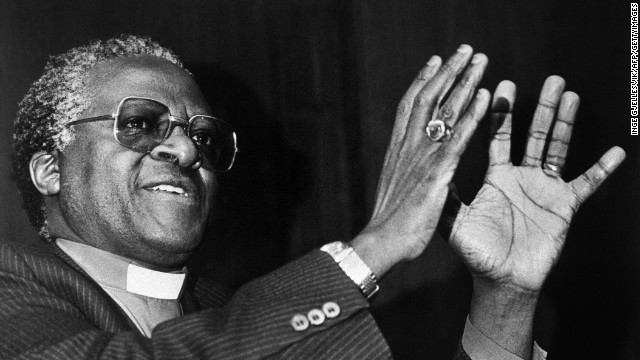 It is a new year. Of course nothing is different from yesterday. However, there is something special about a marker in time, a change of dates; it allows one to reflect, to take stock and to resolve to live more intently, perhaps even differently, beyond that point.
It is a new year. Of course nothing is different from yesterday. However, there is something special about a marker in time, a change of dates; it allows one to reflect, to take stock and to resolve to live more intently, perhaps even differently, beyond that point.
We ushered in the new year with friends. We talked, laughed, prayed, and even argued. I guess that there was hardly a gathering in South Africa that didn't have some conversation about the challenges we face in South Africa - many of which were exposed in 2015. We remain economically unequal. We remain divided by race and class. We remain suspicious and fearful of one another. We long for change.
I said to my family and friends that my commitment in the year ahead would be to work more ardently for the common good of all South Africans, and for South Africa. I am inspired by the following quote from Desmond Tutu's sermon at the funeral service of slain anti-Apartheid activist Steve Biko in 1977:
We are experiencing the birth pangs of a new South Africa, a free South Africa, where all of us, Black and White together, will walk tall, where all of us, Black and White together, will hold hands as we stride forth on the Freedom March to usher in the new South Africa where people will matter because they are human beings made in the image of God… for the sake of our children, Black and White together, let us dedicate ourselves anew to the struggle for the liberation of our beloved land, South Africa. Let us all, Black and White together, not be filled with despondency and despair. Let us Blacks not be filled with hatred and bitterness. For all of us, Black and White together, shall overcome, nay, indeed have already overcome.
- Desmond Tutu (at the funeral of Steve Biko in 1977).
The task may be challenging and complex. It will require courage, sacrifice, perhaps even robust engagement, and above all grace and love. But just because it is complex we must not, and should not, shy away from doing what we can do. We should find ways to address what we can see needs to be done. We must move from a modality of blame to a modality of working together for the common good.
Rich blessing to you and your family, your community and our people and land in 2016. May the end of 2016 show that we have laboured well and achieved much.
Hope is hearing the melody of the future. Faith is to dance to it.
- Rubem A. Alves (Brazilian educator and liberation theologian).
 Wednesday, October 8, 2014 at 10:12AM
Wednesday, October 8, 2014 at 10:12AM
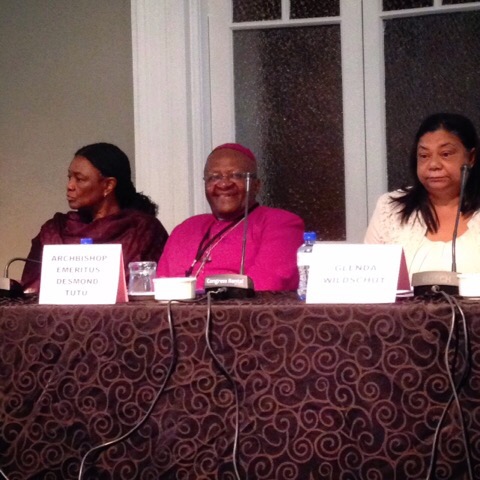
Today Archbishop Desmond Tutu opened the reenactment of Truth and Reconciliation Commission conference in the Faculty of Theology at Stellenbosch University.
The core of his message was that God is still weeping over South Africa. Even though our people were promised freedom, they still struggle in poverty, face oppression and are not truly free.
God is still weeping - the Churches and faith communities still have a critical role to play In working for the liberation of South Africa's people. God is still weeping - the Churches and faith communities must hold the servants and leaders of the nation to account for their leadership and stewardship of power and resources.
I recorded the speech (the recording was interrupted so it is in two parts). Please copy each link into your browser and you should be able to download the two recordings and listen to the.
Archbishop Tutu opening speech part 1
https://www.dropbox.com/s/vqf847oo9godzgk/Desmond%20Tutu%20TRC1%208%20Oct%202014.mp3?dl=0
Archbishop Tutu opening speech part 2
https://www.dropbox.com/s/1ij2evy4jn9r2pe/Desmond%20Tutu%20TRC2%208%20Oct%202014.mp3?dl=0
I would love to hear your ideas and feedback on Archbishop Tutu's opening address and the role of Christians, the Churches, faith communities and people of faith in the "re-humanization" of South African society?
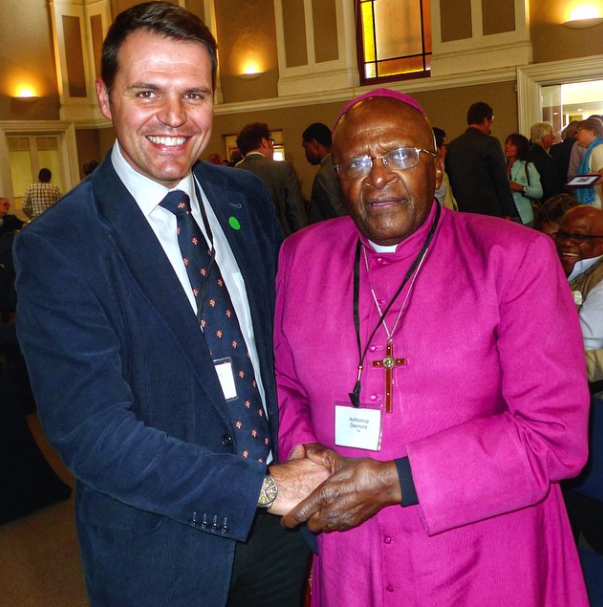 I have the responsibility and privilege of representing the Methodist Church of SA at these hearings since our Presiding Bishop was unable to attend and asked me to participate on his behalf.
I have the responsibility and privilege of representing the Methodist Church of SA at these hearings since our Presiding Bishop was unable to attend and asked me to participate on his behalf.